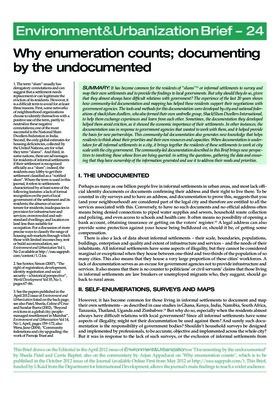Why enumeration counts; documenting by the undocumented

It has become common for the residents of “slums” or informal settlements to survey and map their own settlements and to provide the findings to local governments. But why should they do so, given that they almost always have difficult relations with government? The experience of the last 20 years shows how community-led documentation and mapping has helped these residents support their negotiations with government agencies. The tools and methods for this documentation were developed by city and national federations of shack/slum dwellers, who also formed their own umbrella group, Shack/Slum Dwellers International, to help them exchange experiences and learn from each other. Sometimes, the documentation they developed helped them avoid eviction, as it showed the economic importance of their settlements. In other instances, the documentation was in response to government agencies that wanted to work with them, and it helped provide the basis for new partnerships. This community-led documentation also generates new knowledge that helps residents to think about their priorities and their own resources and capacities. When documentation is undertaken for all informal settlements in a city, it brings together the residents of these settlements to work at city scale with the city government. The community-led documentation described in this Brief brings new perspectives to involving those whose lives are being queried: in setting the questions, gathering the data and ensuring that they have ownership of the information generated and use it to address their needs and priorities.
Cite this publication
Available at https://www.iied.org/10616iied